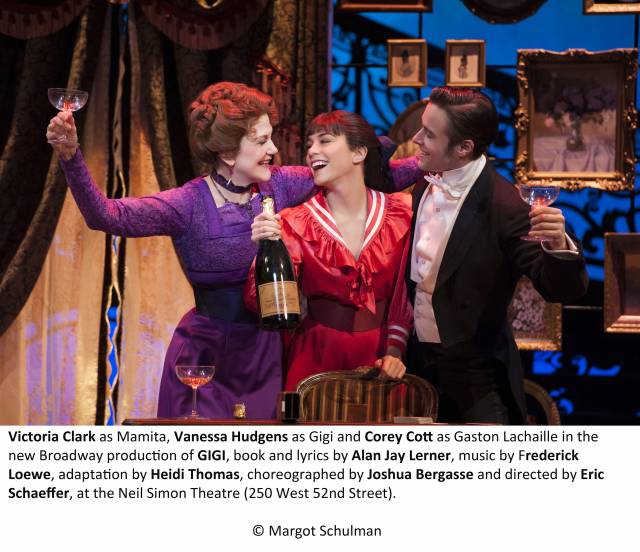
 Thank heaven for Heidi Thomas; her revised book of Gigi provided the chauvinistic Lerner/Loewe musical with a much needed push into the 21st century, while preserving the frothiness that made it a delight for past generations. Thomas’ book had been at the center of our rave when the musical played at The Kennedy Center in early 2015, and is once again the most valuable element as the show makes its Broadway debut, with even more revisions that contribute to make it the most enchanting ode to girl power that the Great White Way has seen in quite some time. A timely reminder that feminism and progress go hand in hand.
Thank heaven for Heidi Thomas; her revised book of Gigi provided the chauvinistic Lerner/Loewe musical with a much needed push into the 21st century, while preserving the frothiness that made it a delight for past generations. Thomas’ book had been at the center of our rave when the musical played at The Kennedy Center in early 2015, and is once again the most valuable element as the show makes its Broadway debut, with even more revisions that contribute to make it the most enchanting ode to girl power that the Great White Way has seen in quite some time. A timely reminder that feminism and progress go hand in hand.
The Broadway revival has given the female characters even more agency, Gigi (Vanessa Hudgens) has gone from becoming a charming ingenue, to becoming an even richer character who now not only questions Gaston (Cory Cott), the man who is to take her as his mistress, but she also questions the women in her life who aid in the perpetuation of this old fashioned custom; her grandmother Mamita (Victoria Clark) and her aunt Alicia (Dee Hoty). Thomas is too clever a writer to turn the story’s back on these characters, and instead of blaming them for having failed to see the unjust system they’re trying to fit Gigi into, instead helps the audience develop sympathy for them, since they too were part of a system they didn’t understand, but had no choice in belonging to.
The women of Gigi are survivors of an era during which women were denied a formal education and were believed to have little worth unless they had a husband or male protector to look after them. In this latest incarnation, we see more interactions between Mamita and Alicia, and come to understand how the two became so different; the former sought to live a dignified life through working class values, the latter - who was most likely left abandoned and broken-hearted when she was Gigi’s age - chose to live a life of wealth and comfort, completely independent from the slavery cast upon her by sentimentality. Both women came to gain the independence they sough in their lives, Mamita becoming confidant of young men who she taught, and who she might influence for the best, and Alicia turning into a charmingly ruthless defender of women’s rights, as limited as they were during the Belle Epoque.
The scenes between Hudgens, Clark and Hoty inject the show with life, that make us wish we were only seeing them; something not meant as a disservice to the rest of the marvelous ensemble, but intended to highlight just how extraordinary the three of them are. Hudgens especially who appears to age instantly in front of our eyes, going from talking and singing like an adorable child, to slowing her deliveries, singing with a wisdom that wasn’t there a few songs ago; testament not only to her unbeatable timing, but also a perfect way to convey how Gigi was forced to put on masks that would allow her to live in the best possible way she found.
If the review is making Gigi sound too much like a drama, rest assured that all of these sociological commentaries are woven into the plot with such delicacy, that one only realizes how subversive the changes are, after the giddiness of the musical numbers begins to wear off, like waking up from a champagne hangover with newly acquired wisdom if you must. This exquisite production should certainly be required viewing for little girls all over the world who are still trying to find their place in life, not to mention a love song to the strong women who have fought to give the little girls a place to call their own. Thank heaven for them all!